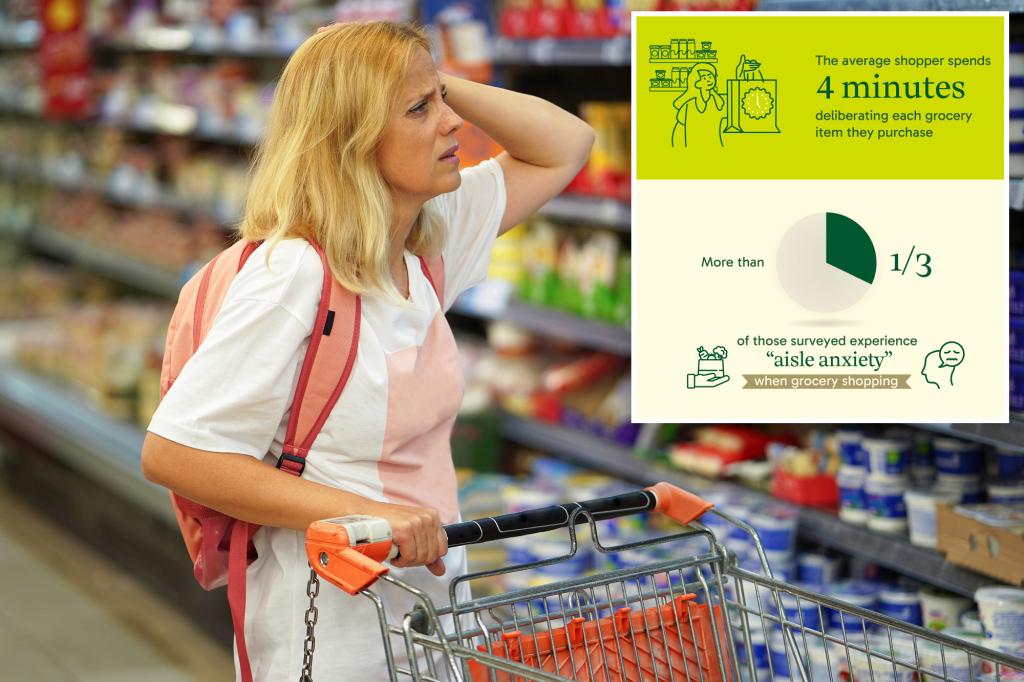The average American second-guesses 41% of their daily decisions, according to new research.
A survey of 2,000 adults explored how they make big and small decisions alike, finding that one in eight are even greater overthinkers who contemplate nearly every decision.
The survey found that the average person makes about 50 decisions in a day, totaling just shy of 1.5 million choices made in a lifetime — and 42% claim to make even more than this.
Even though they make them every day, a quarter of those surveyed find themselves often stressed by making simple decisions (27%).
This decision-making struggle intensifies at the grocery store, as shown in a survey conducted by Talker Research for herbal wellness brand Traditional Medicinals.
One in four also admitted that they often get overwhelmed with choices in the grocery store, and 54% feel pressure to always try and make the “right” purchase.
The survey found that the average person spends four minutes deliberating each item at the grocery store, and nearly a third spend longer doing so (32%).
It only takes the same amount of time for “aisle anxiety” (anxiety during the decision-making process about what to purchase) to kick in while looking for a specific product.
More than a third of those surveyed experience “aisle anxiety” when grocery shopping (36%), sharing that feeling overwhelmed by different options (39%) and crowded by others (37%) sparks this feeling.
Seven in 10 want to be 100% certain that every item in their cart is right for them, and a similar percentage are trying to be more deliberate with their decisions (71%).
As a result, 36% consider themselves to be “product detectives” who research the items they purchase, often scrutinizing labels, packaging, and certifications to ensure they’re making informed choices.
While most shoppers recognize well-known labels like organic (74%) and Fair Trade (53%), far fewer are aware of other certifications that carry equally rigorous standards — like FairWild (46%) and Fair for Life (37%).
“We’re seeing more consumers give thoughtful consideration to the labeling and claims on items they’re considering purchasing, and while certifications like organic and Fair Trade are increasingly familiar to shoppers, awareness of others like Fair for Life or FairWild still lags behind,” said Jamie Horst, chief purpose officer at Traditional Medicinals. “These comprehensive certifications are designed to do that detective work for shoppers. They go beyond the basics, ensuring rigorous ethical, social, and environmental standards are met across every part of the supply chain, from the harvesters to the finished product.”
Forty percent of consumers said that they research food products more today than they did five years ago, specifically looking at claims of being “healthier for you” (38%), non-toxic or “clean” (20%), or containing no added sugar (19%).
They’re also on the lookout for items that are sustainable (45%), purpose-driven (40%), and ethical (38%).
These decisions matter, as half of Americans consider each item that they purchase at the grocery store to be an investment (49%), especially when they help improve their wellbeing (43%), will last a long time before needing to be replaced (34%) or have a long shelf life in general (34%).
Shoppers are more likely to believe that a product is high quality when it comes from a brand they trust (29%) and when there is ingredient transparency (19%).
As long as their decisions feel like the best for themselves (42%) and give them a clear conscience (30%), the time spent thinking is well worth it for shoppers.
Respondents are so dedicated to staying within their goal of what’s worth their money that, on average, they’d pay 39% above retail price for something that is certified as ethical and sustainable.
“Shoppers have told us they view their purchases as an investment, and want to make the ‘right’ choice, but they’re often faced with overwhelming options,” said Horst.
“Third party certifications like Fair for Life and FairWild give people the confidence that their purchase supports fair wages, safe working conditions and environmental stewardship — without having to research every detail themselves. When consumers see a trusted certification, it’s like a shortcut to feeling good about their decision. It means the product has already been vetted to meet high ethical, social and environmental standards, reassuring the consumer that their dollars in the grocery aisle are being spent in a meaningful way.”
Survey methodology:
Talker Research surveyed 2,000 general population Americans; the survey was commissioned by Traditional Medicinals and administered and conducted online by Talker Research between July 22 and July 25, 2025.
Read the full article here

